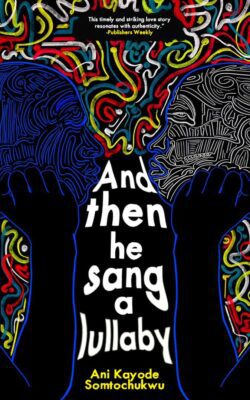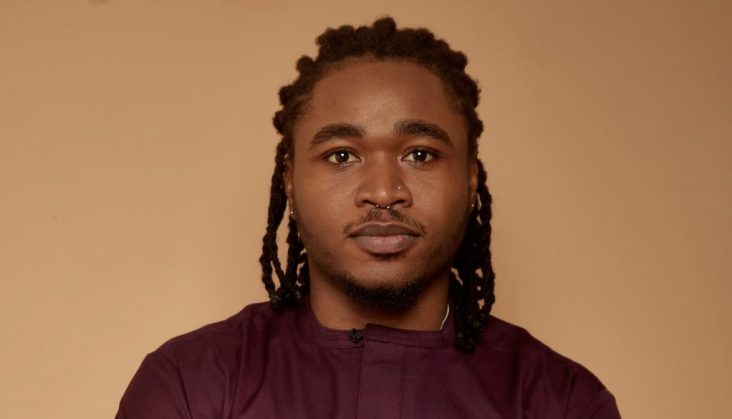Interviews
The Nurturing Kindness of Queer Love – In Conversation with Ani Kayode Somtochukwu
This interview took place between Nnaemeka Nnam and Ani Kayode Somtochukwu via email.
Ani Kayode Somtochukwu is an award-winning Nigerian writer and queer liberation activist. His work interrogates themes of queer identity, resistance, and liberation. His writings have appeared in literary magazines across Africa, Europe, Asia, and North America. And Then He Sang A Lullaby is his debut novel.
Nnaemeka: Hello Kayode, Thank you for granting this interview. I first came across the title of your book on Twitter, back in 2021, when it was shortlisted for the James Currey prize. I fell in love with the title. Please tell me how that title came about because I think it’s just beautiful.
Kayode: Thank you. I’ve been getting a lot of feedback on that title. It has a certain romantic allure that immediately catches the attention. I think when working on any book, there is a specific place in the writing process when the book comes of age, when it becomes aware of what exactly it is, what type of book it is, who it is for, the place it occupies in the mosaic of literature. And for And Then He Sang a Lullaby, it was when August nursed Segun to health even after they already broke up because of August’s betrayal. That’s where the title comes from, the nurturing kindness of queer love. A love that does not need you to come whole, a love that lulls you to sleep after a whole day of strife. I get how foreshadowing it is, now that it’s been pointed out to me. But that was completely incidental.
Nnaemeka: Your manuscript was accepted without an agent and is now the flagship title for Roxane Gay’s newest imprint; Grove Press UK. How did you feel when submitting the manuscript?
Kayode: I felt like I had written a book that I wanted to share with my community. I did not start with Roxane. I sent it to Nigerian publishers and I sent it to agents. Most of them did not reply, one sent me a form rejection. A particular publisher saw promise in it but wasn’t able to publish it immediately and encouraged me to submit it to more publishers. I submitted it to the James Currey Prize and submitted it to Roxane as well. I wasn’t really expecting the call back when it came. Good things like that never come that easy to me, in big ways like that. I’m used to fighting it out, and falling to plan B and then C. The only thing I knew was that I would publish And Then He Sang a Lullaby, even if it was chapter by chapter on my Medium.
Nnaemeka: There is a noticeable political alertness in your book, which is not overwhelming but just the right amount. It feels like the book is conscious of the time and era it was written in, and that’s quite refreshing. How important was it for you to make the book politically aware?
Kayode: Every book is political. How obvious this politicality is, is entirely dependent on how vehemently the book rejects the political status quo. And I think writers are sometimes too afraid of that, afraid of going too far that the whole thing stops being enjoyable. But who says you cannot fall in love watching someone talk of the Bolivarian revolution? Who says your heart cannot break in the most tragically beautiful ways over a mother talking to her son about privatization? Creative writing, for me, is an extension of my political work. I am first and foremost a queer liberation activist. Everything I write, it is my hope that it helps advance the queer liberation struggle in some way. I want people to see the bare basic humanity of people, but I don’t want them to see it in a way that is apolitical. There is everything political about love, about desire, about the rejection of your own dehumanization. There is everything political about two queer men deciding despite their own better judgment to pursue their love even under conditions as stark as state criminalisation. And I guess I wanted to prove that because maybe then even more writers will write without that fear of being too political.
Nnaemeka: Segun was a beautiful boy who was fighting all his life. He was waging a one-man battle against a world that was unrelentingly fighting him and also unaccepting of him, even as a teenager. What was the experience like writing such a brave, loud, beautiful character? Were there moments when writing him was all too heavy? Because Segun was always cheerful even though he has been through hell.
Kayode: Yes, writing Segun was extremely difficult. I poured and poured and poured myself into him, more than I did with August or any other character. So as he had to confront even more and more violence, it was more and more difficult to write it. But I think it is exactly how the world is. When you refuse to keep your head down, when you decide to declare yourself as ardently as your oppressors try to erase you, there are severe consequences. And I hope through Segun we can sit with that and also understand that this does not mean the struggle is not worthwhile. And I wanted to explore how Segun grew into that because revolutionary optimism is something he had to teach himself as he grew politically, as he found community, people he could fight alongside, instead of fighting all alone.
Nnaemeka: I love how you explored August’s grief. As a child born in death, it felt like he was forever cloaked by something thicker than guilt. We see this in how his mother was always present in his mind. It was like his mum died only to live constantly in his head. What was the experience like for you, writing about grief in a way that feels hauntingly present?
Kayode: Grief is a tricky thing to write about and this was an especially thin thread to walk for me. I lost my mother two years before I started writing Lullaby and so I connected with August’s loss on a very personal level. This had its benefits as well as its limitations because I kept finding myself swept away, kept finding myself asking, “Wait, is this show about us?” even though the circumstances of the deaths were nothing alike. Losing a mother can be such an all-consuming loss, and writing a loss like that you have to always stay vigilant so it doesn’t overpower the story. Yes, it was a major part of August’s story but I also didn’t want it to be the story about August. I wanted it to be another layer of complexity to him, another thing that keeps him up and thinking the way we all have things that keep us up and thinking, regrets we carry that we don’t deserve, things like that. What was crucial to me was to explore how births like that can be very tantamount to a contract. Not just any contact but a contract with your family. That interested me. How much could a child like August actually live for himself? I wasn’t sure what the answer was when I started writing and I think the novel ended up doing that question justice.

When you refuse to keep your head down, when you decide to declare yourself as ardently as your oppressors try to erase you, there are severe consequences.
Nnaemeka: I watched some of your tour videos in the U.S with Roxanne Gay, She talked about how you had to physically type your manuscript from paper to your phone. I’m curious, How much did these characters change as you carried from paper to phone and your laptop before it eventually got to Roxanne Gay
Kayode: The characters didn’t change so much, if you can believe that. Lullaby from the get-go was a very character-driven novel so I had a very strong understanding of the characters even before I was certain where the novel was going. What I will say is that that tedious writing process did help me flesh out the story. It gave me a more analytical, more distanced perspective on the novel, particularly because I did a lot of research at that juncture too. While I was writing the initial draft, I couldn’t afford data because my internship did not pay me a kobo. So I took to using placeholders for words on the tip of my tongue or other details I needed to search up on the internet. I would just write “shkkfsfhjhsg” where the missing word was supposed to be and it was during typing that I filled those out. I came to the revision process with the mindset that I hadn’t even completed the first draft yet and I think for how gruelling it was, it did make the novel much better. I have a laptop now and still, I find that there’s a special ease and flow that comes with putting pen on paper.
Nnaemeka: The world that was fighting Segun from a young age is also the world that this book was published in. A world with state-sanctioned violence. Have you thought about how this book will be received in Nigeria? I came across a terribly worded essay accusing Nigerian publishers of favouring Queer stories as opposed to hetero ones, and I thought that was funny because there is a scarcity of queer books in the Nigerian Literary scene.
Kayode: I’ve also seen those claims and it always makes me wonder, where? And furthermore, why is that a bad thing? What’s so wrong with prioritizing queer stories in a climate where queerness gets you ostracized, demonized, maimed and killed? If anything, I think that’s what all publishers should be doing and they’re clearly NOT doing that because the publishing business is at the end of the day still a business. When I started writing this book, a few people who I talked to about it told me it was too politically and homosexually in-your-face for a debut in Nigeria. And true to that word, no Nigerian publisher I sent it to accepted it and I sent it to at least four. Only one publisher even thought it necessary to send me a form rejection. And when Cassava made a pitch for it, the first thing they discussed with me was my safety. I think that from the message of the book, it’s clear that it’s a story that understands that society as it exists today must be disrupted. And that disruption will never be welcomed with open arms. However, I’m optimistic given the reception I’ve received from African readers who have read it. I think it’s one of those books where Nigerian Readers(meaning the literary community) might have a different relationship with it than the general public and I’m not afraid of that. The good thing about books is it gives you the safety of exploring new ideas on your own, at your own pace. And I hope that this book will be that for many people who are looking at this world and seeing that there is something irreconcilably inhumane about queerphobic oppression. I wrote it specifically for queer people, I never tried to use it to make an argument to cis heterosexuals. I like to think that they are never the focus of my writing. Of course, I would love it if everybody enjoys Lullaby and I think it’s a book everyone can enjoy, but if they don’t I wouldn’t judge myself too harshly. My work as an organizer keeps me grounded with regards to just how violently queerphobic Nigerian society is. And my intent is to write things that other queer Africans will read and feel a sense of familiarity with the characters and the story, feel a determination to love ourselves and each other more, to take ourselves as a given. A story that helps us indict queerphobia and capitalist oppression — not our own queerness — as the root cause of our unhappiness and suffering. Because then we have perspective on what is to be done.
Nnaemeka: As a communist and queer person, what was it like being in the U.S. for the first time as a place that is so aggressively capitalist and also the cultural centre for LGBTQ+ people.
Kayode: It was alright. Frankly more than alright and I think it’s partly because I went there with such low expectations and my experience on the tour exceeded all those expectations. It wasn’t the aggressively capitalist part that appealed to me of course. There is a crudeness to American capitalism that is jarring, a crass individualism that I find honestly dehumanizing. But also, I had a publishing team that went above and beyond for me, that was intentional even with the hotels they put me in, that cross checked every last train and flight ticket so that I was never inconvenienced. That reached out and tried to set me up with other radical and African writers so that I felt as at home as possible. My wonderful agent, Emma Shercliff, came all the way from the UK and followed me city to city (Boston to New York and then to DC) making sure I spared time to go out for lunch or to an arts museum or to historical sites. Things like that. And then the reception. I have always been a very ambitious writer. I never doubted that I could write a book that would touch people, but every event was sold out, and Nigerian queer people showed up at every single one to show their support. That really melted my heart, to know that whatever city I was going to, all these kilometers away from Nigeria, queer Africans were there to welcome me, to cheer for me, there’s something so intimate about that that no ideological reservations with the United States could deprive me of.
Nnaemeka: As a debut author, how was the overall experience of publishing?
Kayode: It was very unexpected. Like I said it’s a very personal story so sometimes feedback felt like personal attacks. But I knew it wasn’t and I’m so grateful that I had an editor that respected my work enough to give me creative control. That way, I could relax because no matter how personally slighted I felt, I knew I always had the option of rejecting any edits I did not agree with. I have to really give Roxane credit for this. She told me explicitly, verbally as well as in writing, that I could reject any edits I didn’t want. Her role was purely advisory and that sort of mutual respect made me feel safe to listen to every suggestion without being defensive. I was so afraid of having my work sanitized to the point where it read foreign to the people whose story it was trying to tell and I was ready to fight. I think it’s wonderful that I never had to. I had a good team that worked like a cohesive unit. The time zone was a bit tricky but everyone was always trying to make the process as convenient for me as possible. So perhaps in that way, it’s not the type of publishing story often heard from African debut authors being published in the West. And I am well aware and grateful for that.
About the Writer: Nnaemeka Nnam is a Nigerian writer and bookstagrammer. Nnaemeka wants you to embrace love, sadness and joy as they come. When they are not obsessing over books on Instagram, he’s wishing upon a star.
And Then He Sang A Lullaby is a searingly honest and resonant debut, exploring what love and freedom cost in a society steeped in homophobia. Available here.


